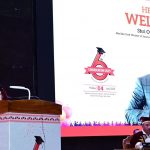Amidst of the one day awareness cum popularization programme under Innovative Extension Strategies for Promotion of Agriculture in Jammu and Kashmir of Holistic Agriculture Development Programme at Dawar, Gurez; when Head KVK-Gurez whispered in my ear that Prof. Swaminathan has left this world; it was not less than a thunder from the blue. I was shocked. With all the participants, a two minutes silence was observed to pay homage to the departed soul and to pray to the almighty that his soul rests in peace.
Late Prof. M. S. Swaminathan; called the ‘Father of Green Revolution’ in India left for his final journey at the age of 98 on Sep. 28, 2023. The person, who transformed Indian agriculture from a condition of food deficiency to food sufficiency and food surplus at present, was the one who developed and spearheaded the introduction of high-yielding wheat and rice varieties in India during the 1960s when the country faced the prospect of widespread famine. Wheat production doubled in just a few years, making the country self-sufficient and saving millions from extreme food deprivation. It was his vision that transformed India almost overnight.
Raising the total crop yield of wheat from 12 million tons to 23 million tons in four crop seasons ended India’s reliance on grain imports. Swaminathan’s collaborative scientific efforts with Prof. Norman Borlaug, spearheading a mass movement with farmers and other scientists and backed by public policies saved India and Pakistan from certain famine-like conditions in the 1960s. Later his leadership as Director General of the International Rice Research Institute (IRRI) in the Philippines was also recognized and he was awarded the first ‘World Food Prize’ in 1987. The World Food Prize is recognized as one of the highest honour in the field of agriculture. The United Nations Environment Programme has called him ‘the Father of Economic Ecology’.
His Life
Late Monkombu Sambasivan Swaminathan popularly known as MSS was born on Aug. 07, 1925 in Madras Presidency as the second son of a Surgeon Dr. M. K. Sambasivan and Ms. Parvati Thangammal Sambasivan. His mother was from Alappuzha district of Kerala. At age 11, after his father’s death, Late M.S was looked after by his father’s brother. Although his parents wanted him to study medicine; but destiny had though some bigger and much more for him. He started off his higher education with zoology, but when he witnessed the impacts of the Bengal famine of 1943 during the Second World War and shortages of rice throughout the sub-continent, he decided to devote his life to ensuring India had enough food. He saw the impact that fluctuations in the price of crops had on his family, including the devastation that weather and pests could cause to crops as well as incomes. All this prompted him to choose agriculture despite his family background of medicine and when medicine and engineering were considered much more prestigious.
His Education
First educated at a local high school and later at the Catholic Little Flower High School in Kumbakonam, he went on to finish his undergraduate degree in zoology at Maharaja’s College in Trivandrum, Kerala He then studied at University of Madras (Madras Agricultural College, now the Tamil Nadu Agricultural University) from 1940 to 1944 and earned a Bachelor of Science degree in Agricultural Science. He started at the Indian Agricultural Research Institute (IARI) in New Delhi in 1947 to study genetics and plant breeding where he obtained a Postgraduate degree in Cytogenetic in 1949. His research focused on the genus Solanum, with specific attention to the potato. He was also selected to the Indian Police Service. At the same time, however, an opportunity for him arose in the agriculture field in the form of a UNESCO fellowship in genetics in the Netherlands.
Swaminathan was a UNESCO fellow at the Wageningen Agricultural University‘s Institute of Genetics in the Netherlands for eight months. In 1950, he moved to study at the Plant Breeding Institute at the School of Agriculture of University of Cambridge. He earned a Doctor of Philosophy degree in 1952 for his thesis ‘Species Differentiation and the Nature of Polyploidy in certain species of the genus Solanum – section Tuberarium.’ Swaminathan also worked as a post-doctoral Research Associate at the University of Wisconsin‘s Laboratory of Genetics in USA for more than a year. Swaminathan turned down a faculty position in this laboratory to make a difference back home in India.
His contributions to Indian Agriculture
In 1954, he joined Indian Agricultural Research Institute (IARI) in New Delhi as an Assistant Cytogeneticist. Swaminathan was critical of India importing food grains when seventy percent of India was dependent on agriculture. Further drought and famine-like situations were developing in the country. Swaminathan learned of Dr. Norman Borlaug’s newly developed Mexican dwarf wheat variety and invited him to India. The two scientists worked side by side to develop wheat varieties that would yield higher levels of grain as well as develop stalk structures strong enough to support the increased biomass. His efforts led to the development of introduction of high yielding wheat and paddy varieties like Sonalika, Larma Rajo IRR8. The new wheat varieties were sown and in 1968 production went to 17 million tonnes, 5 million tonnes more than the last harvest.
MSSRF
M S Swaminathan was also founder of M. S. Swaminathan Research Foundation (MSSRF). It was established in 1988 as a not-for-profit trust. It was with proceeds from the First World Food Prize that he received in 1987. The foundation works on exploiting modern science and technologies for sustainable development of agriculture and also of rural communities. MSSRF focuses specifically on tribal and rural communities with a pro-poor, pro-women and pro-nature approach.
Five Principles of MSS
Prof. Swaminathan had adopted five principles in his life. His five principles inspired millions of other young scientists all across the globe. His five principles were, give your best, believe you can succeed, face adversities squarely, be confident you will find answers when problems arise and go out and win some bouts.
Awards and Recognitions
Owing to the outstanding work done by him in agriculture sector that not only saved India but also shaped the agricultural destiny of many Asian and Latin American countries, he was bestowed with many awards. To mention some of his global achievements and recognitions are Ramon Magsaysay Award for Community Leadership in 1971, the Albert Einstein World Science Award in 1986, World Food Prize in 1987, UN Environment Prize in 1994, the UNESCO Gandhi Gold Medal in 1999; Indira Gandhi Prize for Peace, Disarmament and Development in 1999 and the Franklin D. Roosevelt Four Freedoms Award in 2000, and the Lal Bahadur Shastri National Award in 2007. He is also the recipient of a Padma Shri (1967), a Padma Bhushan (1972) and a Padma Vibhushan (1989) as well. TIME Magazine honored him as one of the twenty most influential Asians of the 20th century.
His contributions to agriculture are unparallel and he will be remembered for centuries not only in India as well as all across the globe as the person who saved this planet from millions of deaths that might have occurred due to hunger and starvation. Former United Nations Secretary General Javier Perez Cuellar once hailed Dr. Swaminathan as ‘a legend who will go into the annals of history as a world scientist of a rare distinction.’
(The author writes on agricultural and social issues, can be reached on [email protected])








